University of Wolverhampton: Neo-classical Theory and Foreign Aid
VerifiedAdded on 2023/04/06
|15
|3166
|262
Essay
AI Summary
This essay critically evaluates the neo-classical theory of economic growth, particularly the Solow model, and discusses the impact of foreign aid on developing countries. It begins by outlining the core assumptions and principles of the Solow model, including diminishing returns to capital and the role of technological progress. The essay then examines the economic development of Taiwan as a case study, highlighting the role of education, technology transfer, and capital expenditure in its rapid growth. It also explores the debate on whether foreign aid causes economic growth, referencing the traditional neoclassical theory and its implications for per capita consumption. The essay concludes by synthesizing these perspectives, offering insights into the complex relationship between economic theory, foreign aid, and sustainable development, with the document being available on Desklib, a platform offering a wide array of study resources.
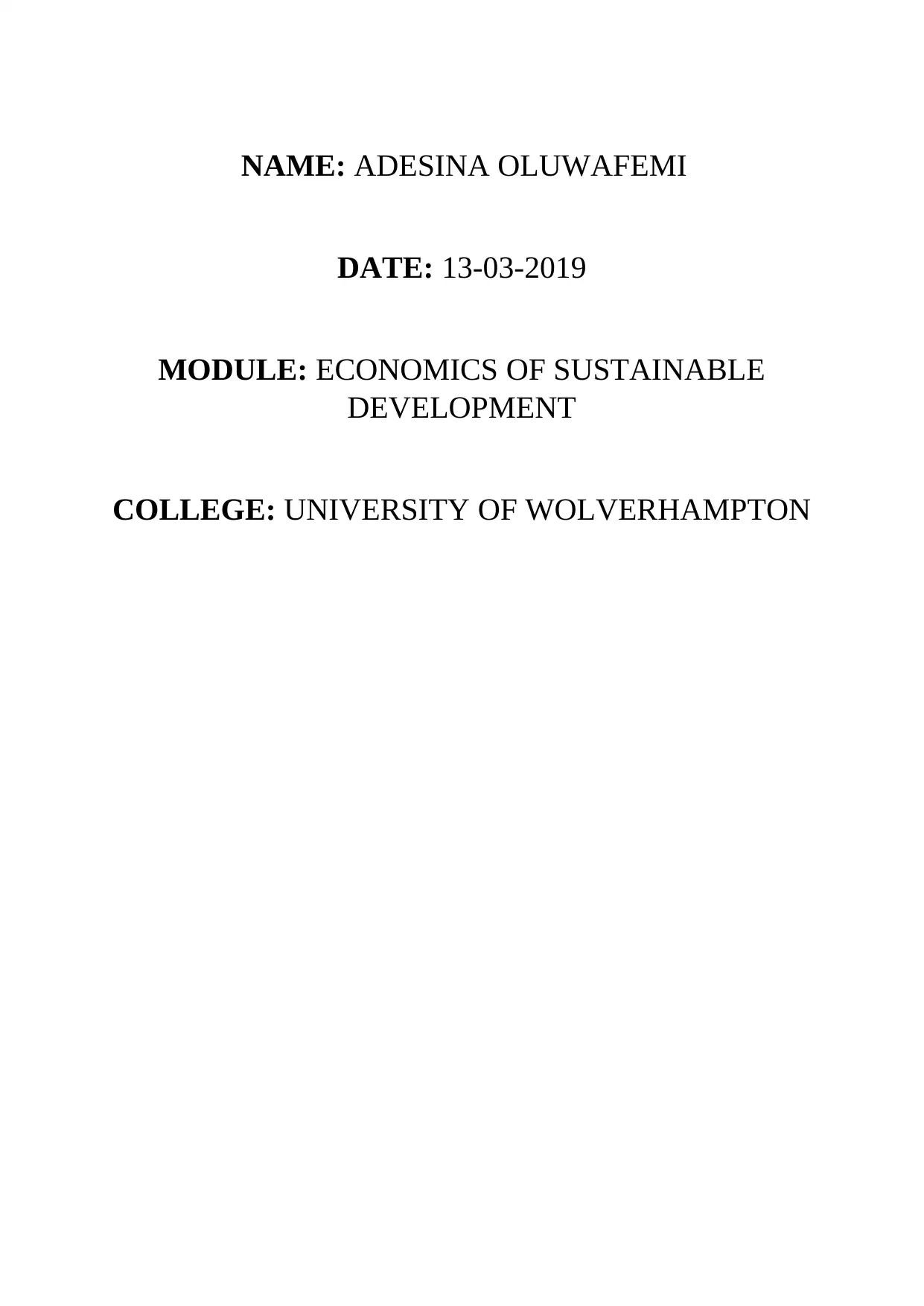
NAME: ADESINA OLUWAFEMI
DATE: 13-03-2019
MODULE: ECONOMICS OF SUSTAINABLE
DEVELOPMENT
COLLEGE: UNIVERSITY OF WOLVERHAMPTON
DATE: 13-03-2019
MODULE: ECONOMICS OF SUSTAINABLE
DEVELOPMENT
COLLEGE: UNIVERSITY OF WOLVERHAMPTON
Paraphrase This Document
Need a fresh take? Get an instant paraphrase of this document with our AI Paraphraser
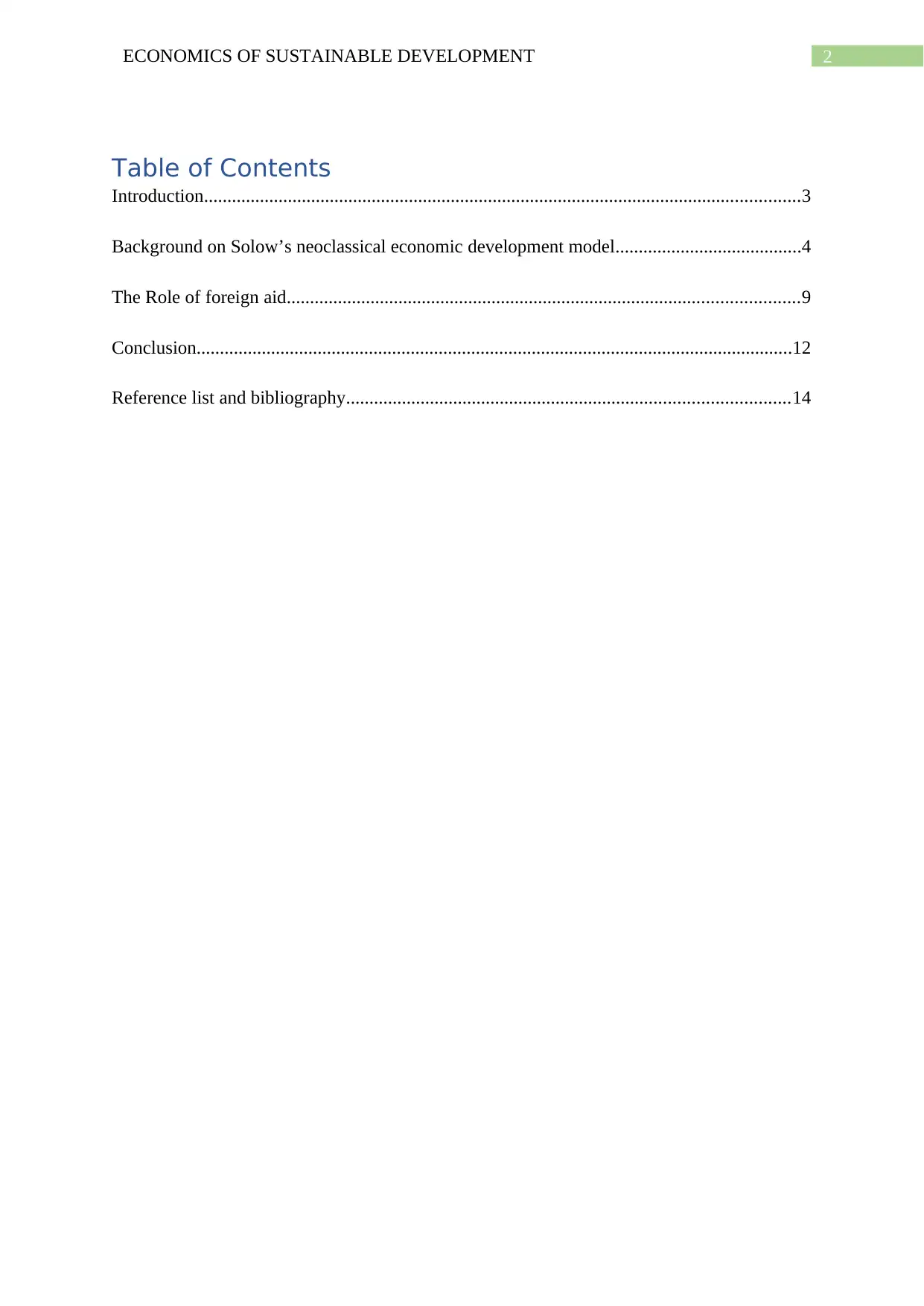
2ECONOMICS OF SUSTAINABLE DEVELOPMENT
Table of Contents
Introduction................................................................................................................................3
Background on Solow’s neoclassical economic development model........................................4
The Role of foreign aid..............................................................................................................9
Conclusion................................................................................................................................12
Reference list and bibliography...............................................................................................14
Table of Contents
Introduction................................................................................................................................3
Background on Solow’s neoclassical economic development model........................................4
The Role of foreign aid..............................................................................................................9
Conclusion................................................................................................................................12
Reference list and bibliography...............................................................................................14
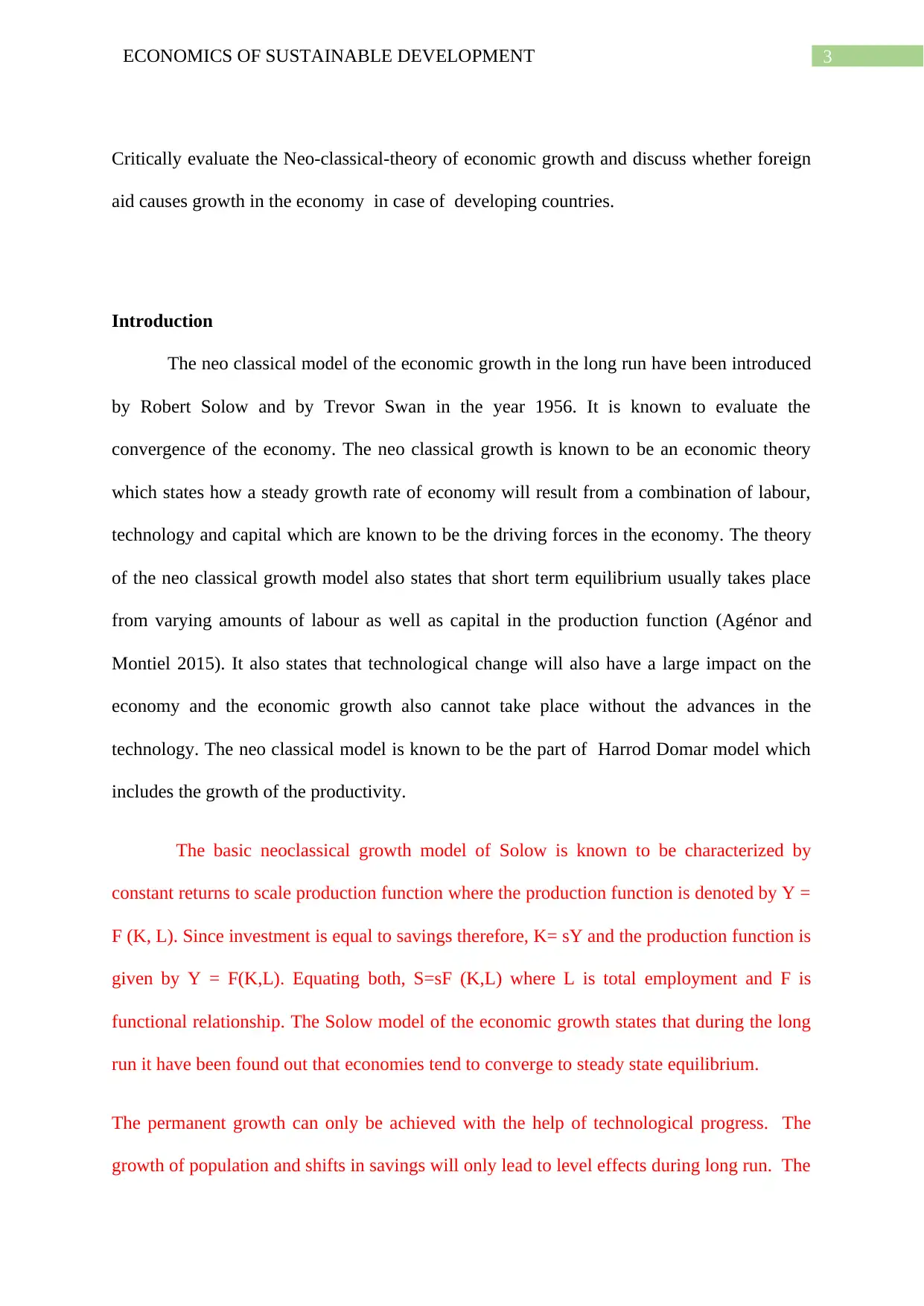
3ECONOMICS OF SUSTAINABLE DEVELOPMENT
Critically evaluate the Neo-classical-theory of economic growth and discuss whether foreign
aid causes growth in the economy in case of developing countries.
Introduction
The neo classical model of the economic growth in the long run have been introduced
by Robert Solow and by Trevor Swan in the year 1956. It is known to evaluate the
convergence of the economy. The neo classical growth is known to be an economic theory
which states how a steady growth rate of economy will result from a combination of labour,
technology and capital which are known to be the driving forces in the economy. The theory
of the neo classical growth model also states that short term equilibrium usually takes place
from varying amounts of labour as well as capital in the production function (Agénor and
Montiel 2015). It also states that technological change will also have a large impact on the
economy and the economic growth also cannot take place without the advances in the
technology. The neo classical model is known to be the part of Harrod Domar model which
includes the growth of the productivity.
The basic neoclassical growth model of Solow is known to be characterized by
constant returns to scale production function where the production function is denoted by Y =
F (K, L). Since investment is equal to savings therefore, K= sY and the production function is
given by Y = F(K,L). Equating both, S=sF (K,L) where L is total employment and F is
functional relationship. The Solow model of the economic growth states that during the long
run it have been found out that economies tend to converge to steady state equilibrium.
The permanent growth can only be achieved with the help of technological progress. The
growth of population and shifts in savings will only lead to level effects during long run. The
Critically evaluate the Neo-classical-theory of economic growth and discuss whether foreign
aid causes growth in the economy in case of developing countries.
Introduction
The neo classical model of the economic growth in the long run have been introduced
by Robert Solow and by Trevor Swan in the year 1956. It is known to evaluate the
convergence of the economy. The neo classical growth is known to be an economic theory
which states how a steady growth rate of economy will result from a combination of labour,
technology and capital which are known to be the driving forces in the economy. The theory
of the neo classical growth model also states that short term equilibrium usually takes place
from varying amounts of labour as well as capital in the production function (Agénor and
Montiel 2015). It also states that technological change will also have a large impact on the
economy and the economic growth also cannot take place without the advances in the
technology. The neo classical model is known to be the part of Harrod Domar model which
includes the growth of the productivity.
The basic neoclassical growth model of Solow is known to be characterized by
constant returns to scale production function where the production function is denoted by Y =
F (K, L). Since investment is equal to savings therefore, K= sY and the production function is
given by Y = F(K,L). Equating both, S=sF (K,L) where L is total employment and F is
functional relationship. The Solow model of the economic growth states that during the long
run it have been found out that economies tend to converge to steady state equilibrium.
The permanent growth can only be achieved with the help of technological progress. The
growth of population and shifts in savings will only lead to level effects during long run. The
⊘ This is a preview!⊘
Do you want full access?
Subscribe today to unlock all pages.

Trusted by 1+ million students worldwide
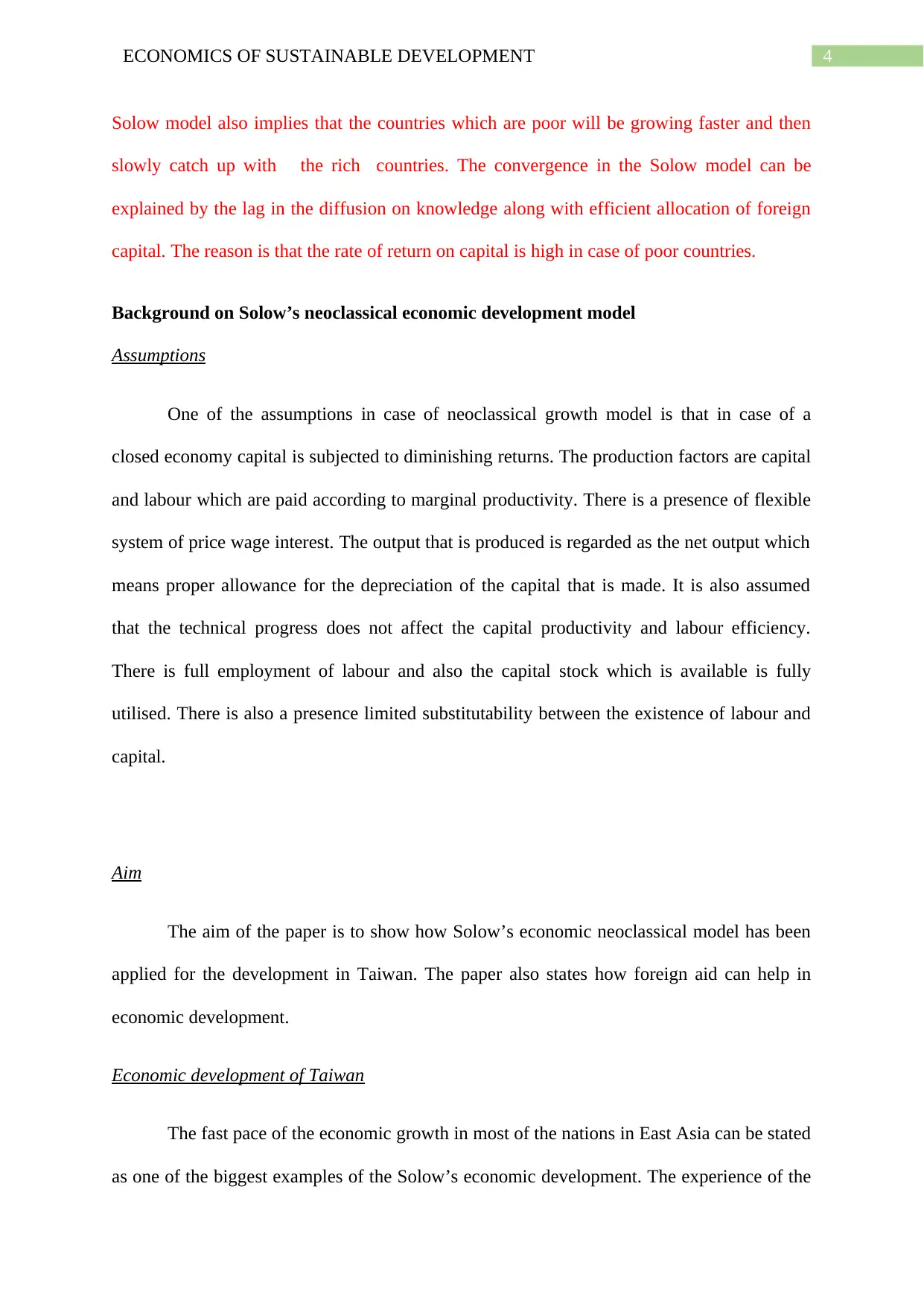
4ECONOMICS OF SUSTAINABLE DEVELOPMENT
Solow model also implies that the countries which are poor will be growing faster and then
slowly catch up with the rich countries. The convergence in the Solow model can be
explained by the lag in the diffusion on knowledge along with efficient allocation of foreign
capital. The reason is that the rate of return on capital is high in case of poor countries.
Background on Solow’s neoclassical economic development model
Assumptions
One of the assumptions in case of neoclassical growth model is that in case of a
closed economy capital is subjected to diminishing returns. The production factors are capital
and labour which are paid according to marginal productivity. There is a presence of flexible
system of price wage interest. The output that is produced is regarded as the net output which
means proper allowance for the depreciation of the capital that is made. It is also assumed
that the technical progress does not affect the capital productivity and labour efficiency.
There is full employment of labour and also the capital stock which is available is fully
utilised. There is also a presence limited substitutability between the existence of labour and
capital.
Aim
The aim of the paper is to show how Solow’s economic neoclassical model has been
applied for the development in Taiwan. The paper also states how foreign aid can help in
economic development.
Economic development of Taiwan
The fast pace of the economic growth in most of the nations in East Asia can be stated
as one of the biggest examples of the Solow’s economic development. The experience of the
Solow model also implies that the countries which are poor will be growing faster and then
slowly catch up with the rich countries. The convergence in the Solow model can be
explained by the lag in the diffusion on knowledge along with efficient allocation of foreign
capital. The reason is that the rate of return on capital is high in case of poor countries.
Background on Solow’s neoclassical economic development model
Assumptions
One of the assumptions in case of neoclassical growth model is that in case of a
closed economy capital is subjected to diminishing returns. The production factors are capital
and labour which are paid according to marginal productivity. There is a presence of flexible
system of price wage interest. The output that is produced is regarded as the net output which
means proper allowance for the depreciation of the capital that is made. It is also assumed
that the technical progress does not affect the capital productivity and labour efficiency.
There is full employment of labour and also the capital stock which is available is fully
utilised. There is also a presence limited substitutability between the existence of labour and
capital.
Aim
The aim of the paper is to show how Solow’s economic neoclassical model has been
applied for the development in Taiwan. The paper also states how foreign aid can help in
economic development.
Economic development of Taiwan
The fast pace of the economic growth in most of the nations in East Asia can be stated
as one of the biggest examples of the Solow’s economic development. The experience of the
Paraphrase This Document
Need a fresh take? Get an instant paraphrase of this document with our AI Paraphraser
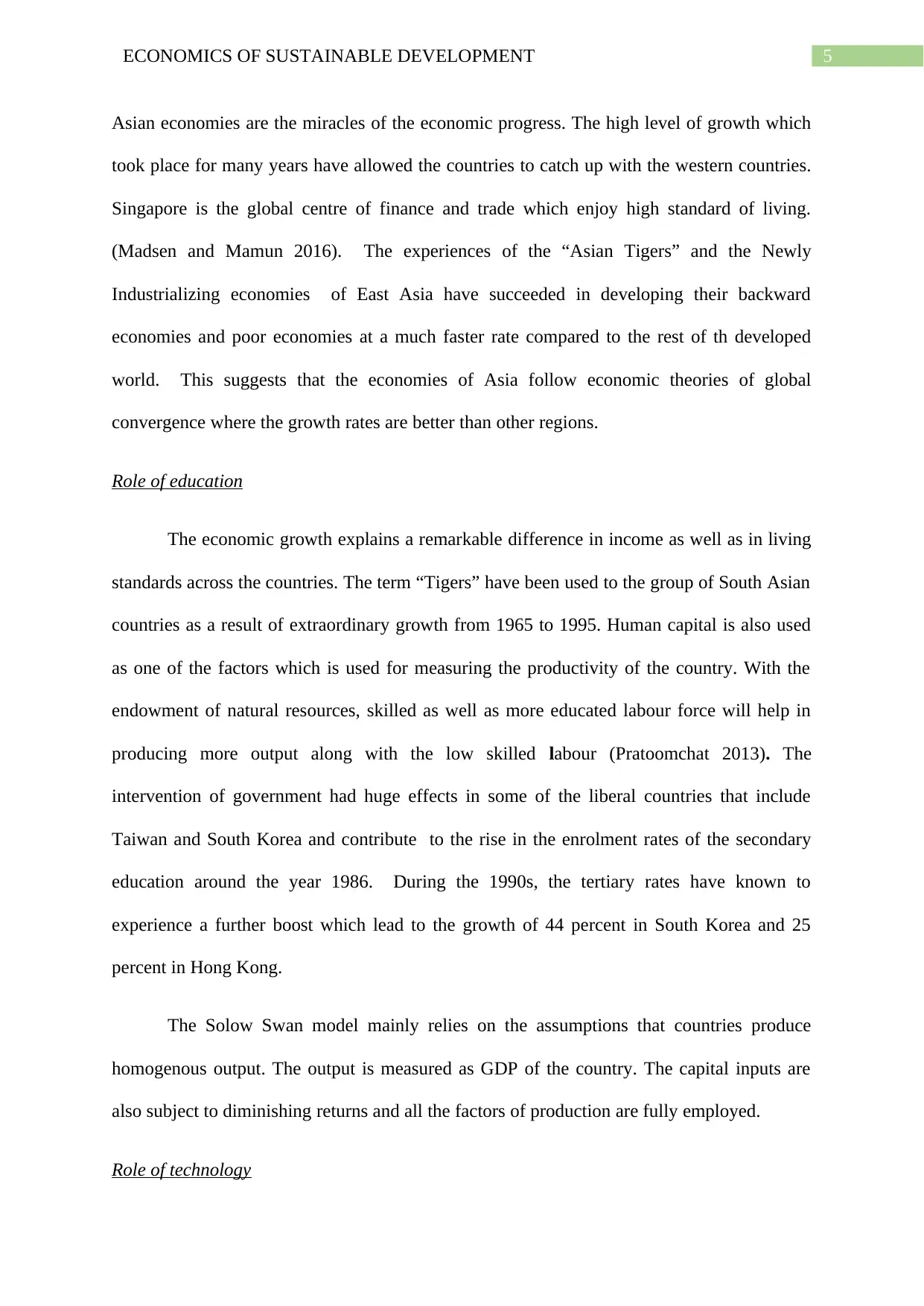
5ECONOMICS OF SUSTAINABLE DEVELOPMENT
Asian economies are the miracles of the economic progress. The high level of growth which
took place for many years have allowed the countries to catch up with the western countries.
Singapore is the global centre of finance and trade which enjoy high standard of living.
(Madsen and Mamun 2016). The experiences of the “Asian Tigers” and the Newly
Industrializing economies of East Asia have succeeded in developing their backward
economies and poor economies at a much faster rate compared to the rest of th developed
world. This suggests that the economies of Asia follow economic theories of global
convergence where the growth rates are better than other regions.
Role of education
The economic growth explains a remarkable difference in income as well as in living
standards across the countries. The term “Tigers” have been used to the group of South Asian
countries as a result of extraordinary growth from 1965 to 1995. Human capital is also used
as one of the factors which is used for measuring the productivity of the country. With the
endowment of natural resources, skilled as well as more educated labour force will help in
producing more output along with the low skilled labour (Pratoomchat 2013). The
intervention of government had huge effects in some of the liberal countries that include
Taiwan and South Korea and contribute to the rise in the enrolment rates of the secondary
education around the year 1986. During the 1990s, the tertiary rates have known to
experience a further boost which lead to the growth of 44 percent in South Korea and 25
percent in Hong Kong.
The Solow Swan model mainly relies on the assumptions that countries produce
homogenous output. The output is measured as GDP of the country. The capital inputs are
also subject to diminishing returns and all the factors of production are fully employed.
Role of technology
Asian economies are the miracles of the economic progress. The high level of growth which
took place for many years have allowed the countries to catch up with the western countries.
Singapore is the global centre of finance and trade which enjoy high standard of living.
(Madsen and Mamun 2016). The experiences of the “Asian Tigers” and the Newly
Industrializing economies of East Asia have succeeded in developing their backward
economies and poor economies at a much faster rate compared to the rest of th developed
world. This suggests that the economies of Asia follow economic theories of global
convergence where the growth rates are better than other regions.
Role of education
The economic growth explains a remarkable difference in income as well as in living
standards across the countries. The term “Tigers” have been used to the group of South Asian
countries as a result of extraordinary growth from 1965 to 1995. Human capital is also used
as one of the factors which is used for measuring the productivity of the country. With the
endowment of natural resources, skilled as well as more educated labour force will help in
producing more output along with the low skilled labour (Pratoomchat 2013). The
intervention of government had huge effects in some of the liberal countries that include
Taiwan and South Korea and contribute to the rise in the enrolment rates of the secondary
education around the year 1986. During the 1990s, the tertiary rates have known to
experience a further boost which lead to the growth of 44 percent in South Korea and 25
percent in Hong Kong.
The Solow Swan model mainly relies on the assumptions that countries produce
homogenous output. The output is measured as GDP of the country. The capital inputs are
also subject to diminishing returns and all the factors of production are fully employed.
Role of technology
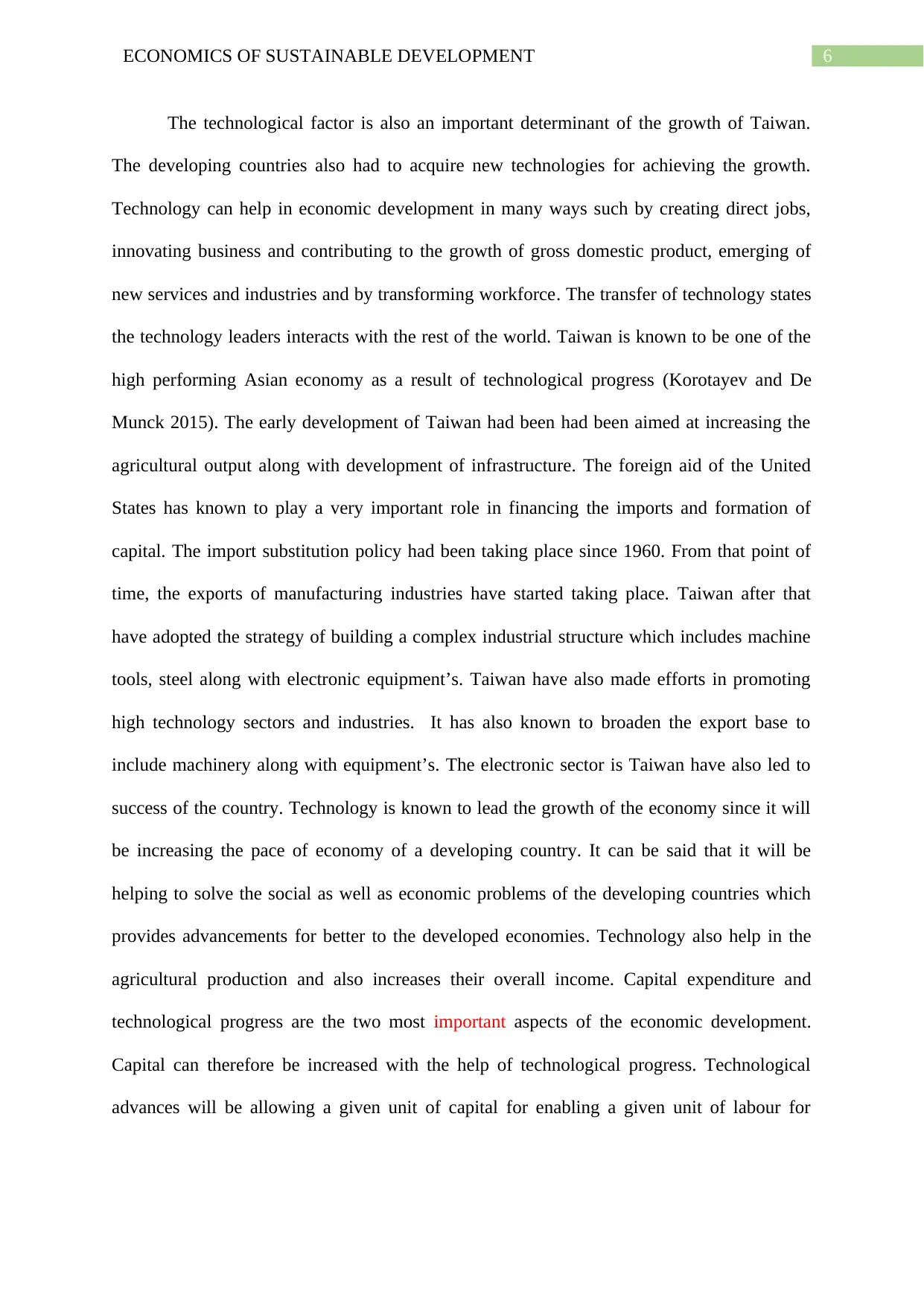
6ECONOMICS OF SUSTAINABLE DEVELOPMENT
The technological factor is also an important determinant of the growth of Taiwan.
The developing countries also had to acquire new technologies for achieving the growth.
Technology can help in economic development in many ways such by creating direct jobs,
innovating business and contributing to the growth of gross domestic product, emerging of
new services and industries and by transforming workforce. The transfer of technology states
the technology leaders interacts with the rest of the world. Taiwan is known to be one of the
high performing Asian economy as a result of technological progress (Korotayev and De
Munck 2015). The early development of Taiwan had been had been aimed at increasing the
agricultural output along with development of infrastructure. The foreign aid of the United
States has known to play a very important role in financing the imports and formation of
capital. The import substitution policy had been taking place since 1960. From that point of
time, the exports of manufacturing industries have started taking place. Taiwan after that
have adopted the strategy of building a complex industrial structure which includes machine
tools, steel along with electronic equipment’s. Taiwan have also made efforts in promoting
high technology sectors and industries. It has also known to broaden the export base to
include machinery along with equipment’s. The electronic sector is Taiwan have also led to
success of the country. Technology is known to lead the growth of the economy since it will
be increasing the pace of economy of a developing country. It can be said that it will be
helping to solve the social as well as economic problems of the developing countries which
provides advancements for better to the developed economies. Technology also help in the
agricultural production and also increases their overall income. Capital expenditure and
technological progress are the two most important aspects of the economic development.
Capital can therefore be increased with the help of technological progress. Technological
advances will be allowing a given unit of capital for enabling a given unit of labour for
The technological factor is also an important determinant of the growth of Taiwan.
The developing countries also had to acquire new technologies for achieving the growth.
Technology can help in economic development in many ways such by creating direct jobs,
innovating business and contributing to the growth of gross domestic product, emerging of
new services and industries and by transforming workforce. The transfer of technology states
the technology leaders interacts with the rest of the world. Taiwan is known to be one of the
high performing Asian economy as a result of technological progress (Korotayev and De
Munck 2015). The early development of Taiwan had been had been aimed at increasing the
agricultural output along with development of infrastructure. The foreign aid of the United
States has known to play a very important role in financing the imports and formation of
capital. The import substitution policy had been taking place since 1960. From that point of
time, the exports of manufacturing industries have started taking place. Taiwan after that
have adopted the strategy of building a complex industrial structure which includes machine
tools, steel along with electronic equipment’s. Taiwan have also made efforts in promoting
high technology sectors and industries. It has also known to broaden the export base to
include machinery along with equipment’s. The electronic sector is Taiwan have also led to
success of the country. Technology is known to lead the growth of the economy since it will
be increasing the pace of economy of a developing country. It can be said that it will be
helping to solve the social as well as economic problems of the developing countries which
provides advancements for better to the developed economies. Technology also help in the
agricultural production and also increases their overall income. Capital expenditure and
technological progress are the two most important aspects of the economic development.
Capital can therefore be increased with the help of technological progress. Technological
advances will be allowing a given unit of capital for enabling a given unit of labour for
⊘ This is a preview!⊘
Do you want full access?
Subscribe today to unlock all pages.

Trusted by 1+ million students worldwide
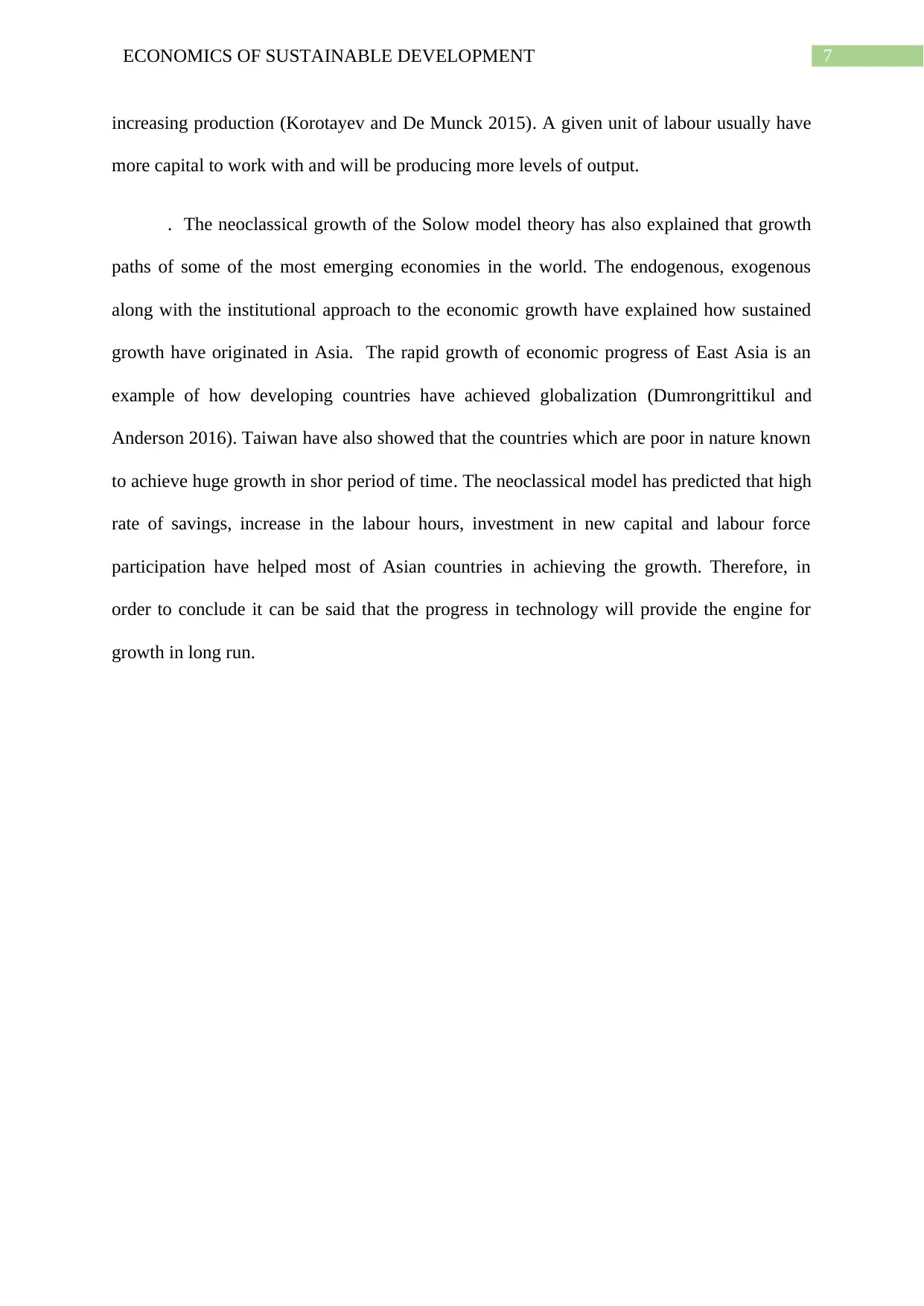
7ECONOMICS OF SUSTAINABLE DEVELOPMENT
increasing production (Korotayev and De Munck 2015). A given unit of labour usually have
more capital to work with and will be producing more levels of output.
. The neoclassical growth of the Solow model theory has also explained that growth
paths of some of the most emerging economies in the world. The endogenous, exogenous
along with the institutional approach to the economic growth have explained how sustained
growth have originated in Asia. The rapid growth of economic progress of East Asia is an
example of how developing countries have achieved globalization (Dumrongrittikul and
Anderson 2016). Taiwan have also showed that the countries which are poor in nature known
to achieve huge growth in shor period of time. The neoclassical model has predicted that high
rate of savings, increase in the labour hours, investment in new capital and labour force
participation have helped most of Asian countries in achieving the growth. Therefore, in
order to conclude it can be said that the progress in technology will provide the engine for
growth in long run.
increasing production (Korotayev and De Munck 2015). A given unit of labour usually have
more capital to work with and will be producing more levels of output.
. The neoclassical growth of the Solow model theory has also explained that growth
paths of some of the most emerging economies in the world. The endogenous, exogenous
along with the institutional approach to the economic growth have explained how sustained
growth have originated in Asia. The rapid growth of economic progress of East Asia is an
example of how developing countries have achieved globalization (Dumrongrittikul and
Anderson 2016). Taiwan have also showed that the countries which are poor in nature known
to achieve huge growth in shor period of time. The neoclassical model has predicted that high
rate of savings, increase in the labour hours, investment in new capital and labour force
participation have helped most of Asian countries in achieving the growth. Therefore, in
order to conclude it can be said that the progress in technology will provide the engine for
growth in long run.
Paraphrase This Document
Need a fresh take? Get an instant paraphrase of this document with our AI Paraphraser
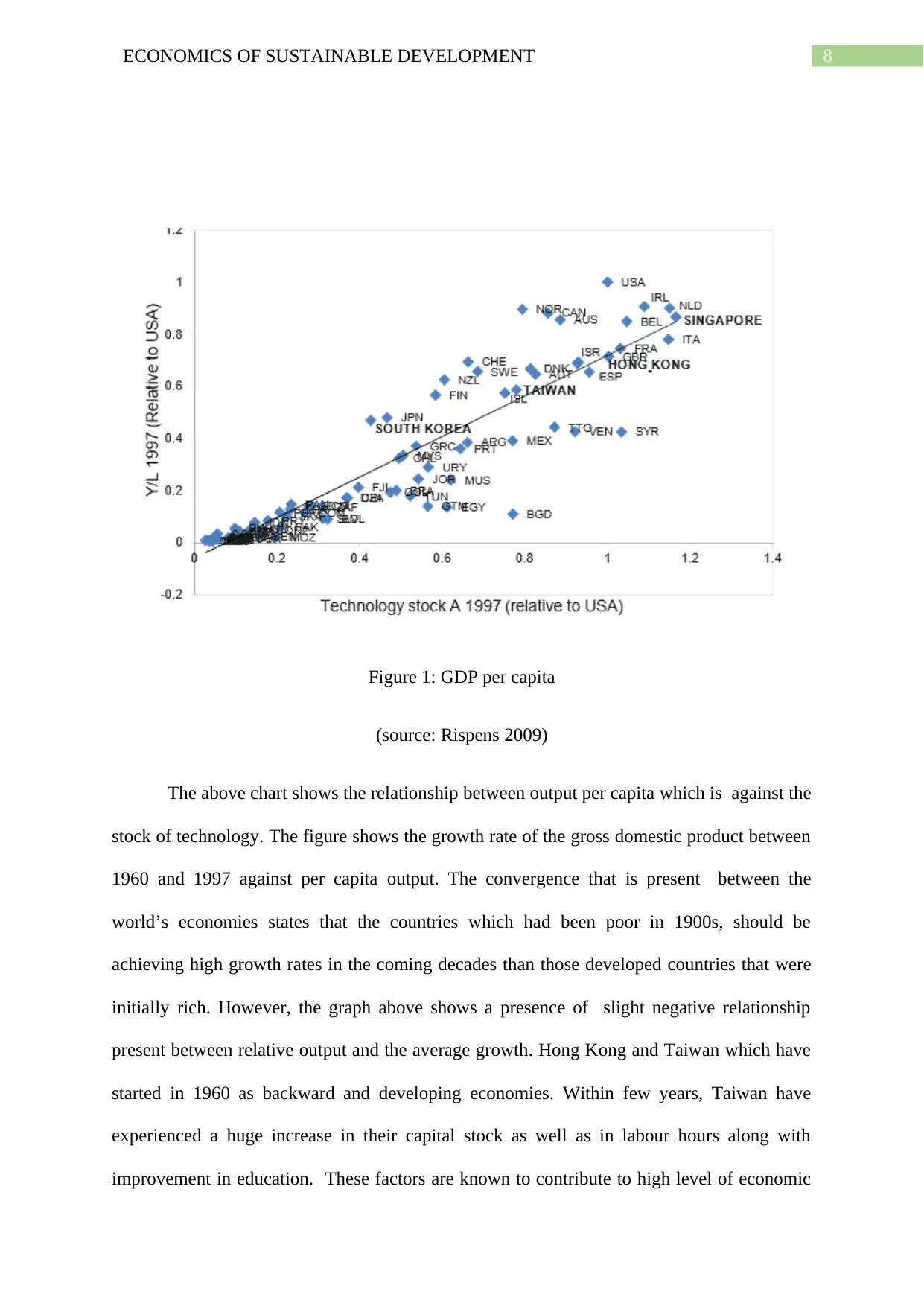
8ECONOMICS OF SUSTAINABLE DEVELOPMENT
Figure 1: GDP per capita
(source: Rispens 2009)
The above chart shows the relationship between output per capita which is against the
stock of technology. The figure shows the growth rate of the gross domestic product between
1960 and 1997 against per capita output. The convergence that is present between the
world’s economies states that the countries which had been poor in 1900s, should be
achieving high growth rates in the coming decades than those developed countries that were
initially rich. However, the graph above shows a presence of slight negative relationship
present between relative output and the average growth. Hong Kong and Taiwan which have
started in 1960 as backward and developing economies. Within few years, Taiwan have
experienced a huge increase in their capital stock as well as in labour hours along with
improvement in education. These factors are known to contribute to high level of economic
Figure 1: GDP per capita
(source: Rispens 2009)
The above chart shows the relationship between output per capita which is against the
stock of technology. The figure shows the growth rate of the gross domestic product between
1960 and 1997 against per capita output. The convergence that is present between the
world’s economies states that the countries which had been poor in 1900s, should be
achieving high growth rates in the coming decades than those developed countries that were
initially rich. However, the graph above shows a presence of slight negative relationship
present between relative output and the average growth. Hong Kong and Taiwan which have
started in 1960 as backward and developing economies. Within few years, Taiwan have
experienced a huge increase in their capital stock as well as in labour hours along with
improvement in education. These factors are known to contribute to high level of economic
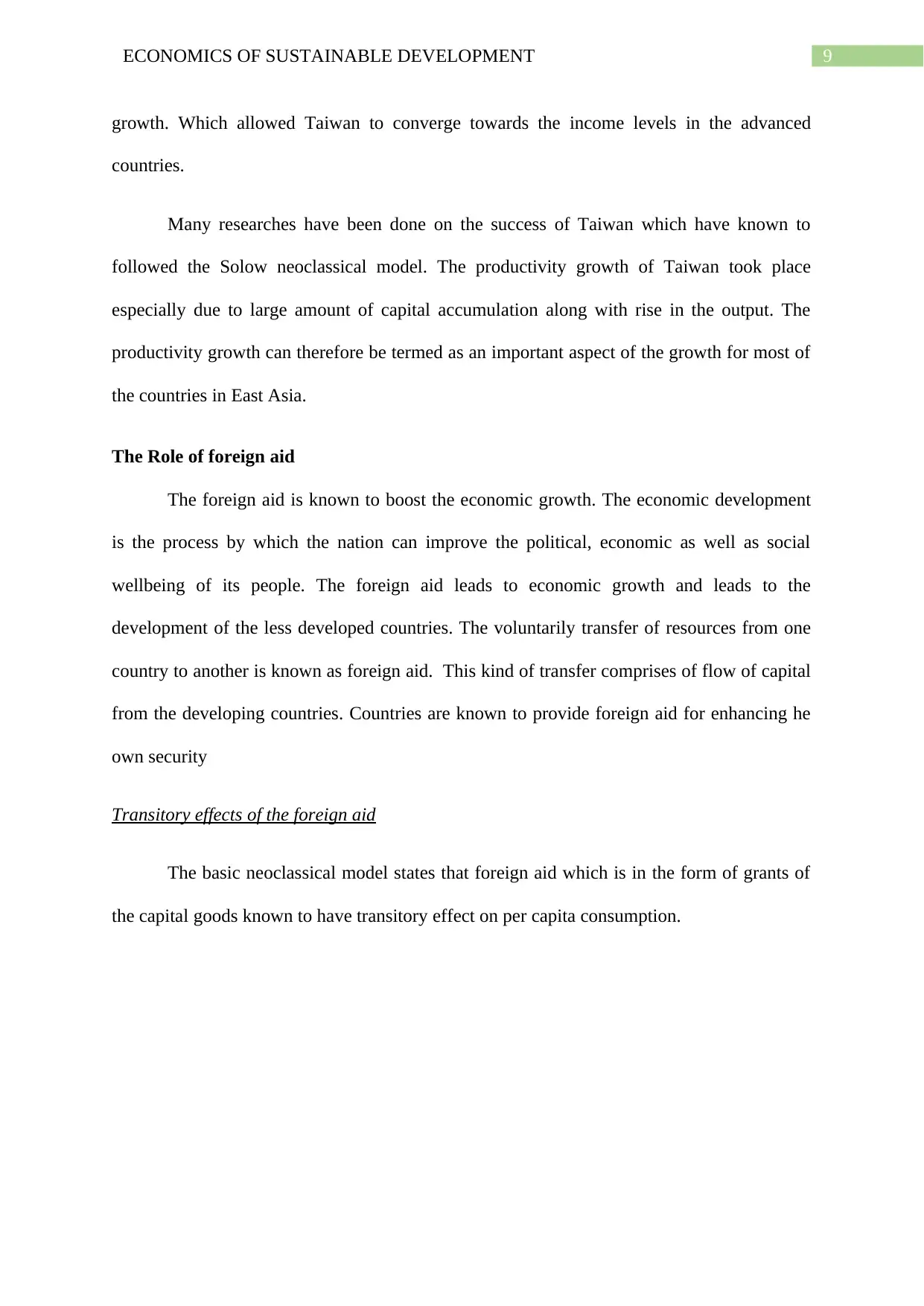
9ECONOMICS OF SUSTAINABLE DEVELOPMENT
growth. Which allowed Taiwan to converge towards the income levels in the advanced
countries.
Many researches have been done on the success of Taiwan which have known to
followed the Solow neoclassical model. The productivity growth of Taiwan took place
especially due to large amount of capital accumulation along with rise in the output. The
productivity growth can therefore be termed as an important aspect of the growth for most of
the countries in East Asia.
The Role of foreign aid
The foreign aid is known to boost the economic growth. The economic development
is the process by which the nation can improve the political, economic as well as social
wellbeing of its people. The foreign aid leads to economic growth and leads to the
development of the less developed countries. The voluntarily transfer of resources from one
country to another is known as foreign aid. This kind of transfer comprises of flow of capital
from the developing countries. Countries are known to provide foreign aid for enhancing he
own security
Transitory effects of the foreign aid
The basic neoclassical model states that foreign aid which is in the form of grants of
the capital goods known to have transitory effect on per capita consumption.
growth. Which allowed Taiwan to converge towards the income levels in the advanced
countries.
Many researches have been done on the success of Taiwan which have known to
followed the Solow neoclassical model. The productivity growth of Taiwan took place
especially due to large amount of capital accumulation along with rise in the output. The
productivity growth can therefore be termed as an important aspect of the growth for most of
the countries in East Asia.
The Role of foreign aid
The foreign aid is known to boost the economic growth. The economic development
is the process by which the nation can improve the political, economic as well as social
wellbeing of its people. The foreign aid leads to economic growth and leads to the
development of the less developed countries. The voluntarily transfer of resources from one
country to another is known as foreign aid. This kind of transfer comprises of flow of capital
from the developing countries. Countries are known to provide foreign aid for enhancing he
own security
Transitory effects of the foreign aid
The basic neoclassical model states that foreign aid which is in the form of grants of
the capital goods known to have transitory effect on per capita consumption.
⊘ This is a preview!⊘
Do you want full access?
Subscribe today to unlock all pages.

Trusted by 1+ million students worldwide
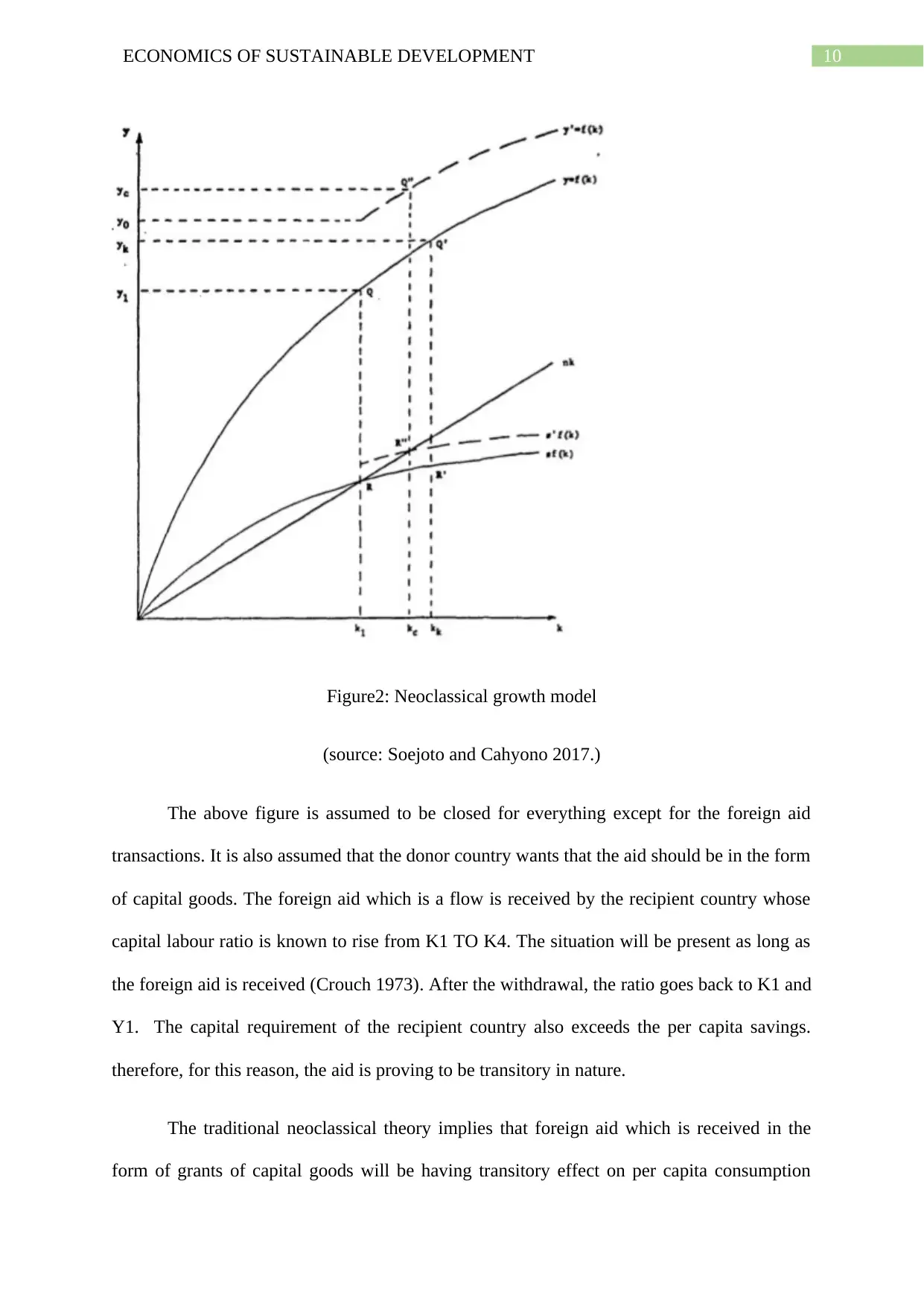
10ECONOMICS OF SUSTAINABLE DEVELOPMENT
Figure2: Neoclassical growth model
(source: Soejoto and Cahyono 2017.)
The above figure is assumed to be closed for everything except for the foreign aid
transactions. It is also assumed that the donor country wants that the aid should be in the form
of capital goods. The foreign aid which is a flow is received by the recipient country whose
capital labour ratio is known to rise from K1 TO K4. The situation will be present as long as
the foreign aid is received (Crouch 1973). After the withdrawal, the ratio goes back to K1 and
Y1. The capital requirement of the recipient country also exceeds the per capita savings.
therefore, for this reason, the aid is proving to be transitory in nature.
The traditional neoclassical theory implies that foreign aid which is received in the
form of grants of capital goods will be having transitory effect on per capita consumption
Figure2: Neoclassical growth model
(source: Soejoto and Cahyono 2017.)
The above figure is assumed to be closed for everything except for the foreign aid
transactions. It is also assumed that the donor country wants that the aid should be in the form
of capital goods. The foreign aid which is a flow is received by the recipient country whose
capital labour ratio is known to rise from K1 TO K4. The situation will be present as long as
the foreign aid is received (Crouch 1973). After the withdrawal, the ratio goes back to K1 and
Y1. The capital requirement of the recipient country also exceeds the per capita savings.
therefore, for this reason, the aid is proving to be transitory in nature.
The traditional neoclassical theory implies that foreign aid which is received in the
form of grants of capital goods will be having transitory effect on per capita consumption
Paraphrase This Document
Need a fresh take? Get an instant paraphrase of this document with our AI Paraphraser
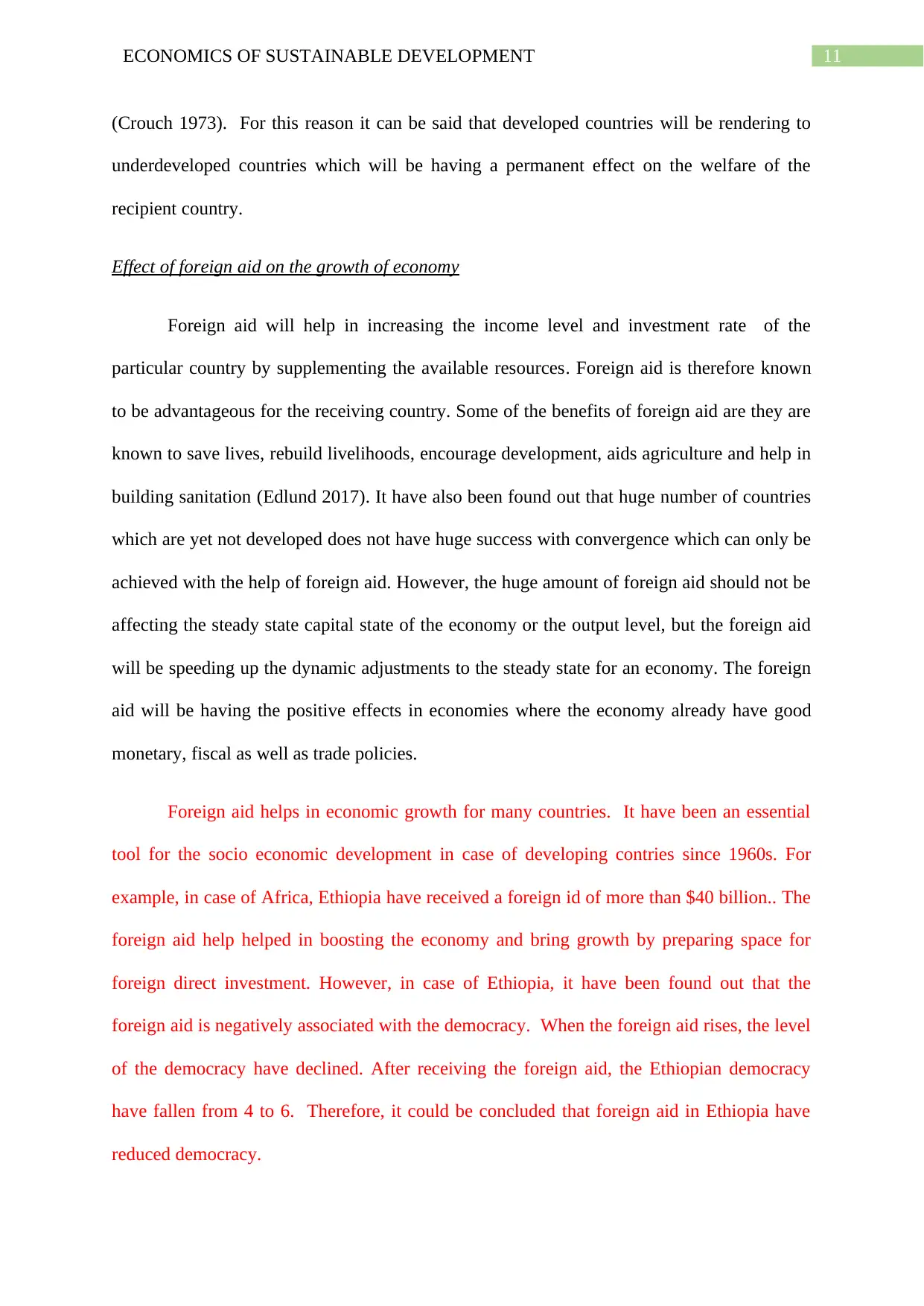
11ECONOMICS OF SUSTAINABLE DEVELOPMENT
(Crouch 1973). For this reason it can be said that developed countries will be rendering to
underdeveloped countries which will be having a permanent effect on the welfare of the
recipient country.
Effect of foreign aid on the growth of economy
Foreign aid will help in increasing the income level and investment rate of the
particular country by supplementing the available resources. Foreign aid is therefore known
to be advantageous for the receiving country. Some of the benefits of foreign aid are they are
known to save lives, rebuild livelihoods, encourage development, aids agriculture and help in
building sanitation (Edlund 2017). It have also been found out that huge number of countries
which are yet not developed does not have huge success with convergence which can only be
achieved with the help of foreign aid. However, the huge amount of foreign aid should not be
affecting the steady state capital state of the economy or the output level, but the foreign aid
will be speeding up the dynamic adjustments to the steady state for an economy. The foreign
aid will be having the positive effects in economies where the economy already have good
monetary, fiscal as well as trade policies.
Foreign aid helps in economic growth for many countries. It have been an essential
tool for the socio economic development in case of developing contries since 1960s. For
example, in case of Africa, Ethiopia have received a foreign id of more than $40 billion.. The
foreign aid help helped in boosting the economy and bring growth by preparing space for
foreign direct investment. However, in case of Ethiopia, it have been found out that the
foreign aid is negatively associated with the democracy. When the foreign aid rises, the level
of the democracy have declined. After receiving the foreign aid, the Ethiopian democracy
have fallen from 4 to 6. Therefore, it could be concluded that foreign aid in Ethiopia have
reduced democracy.
(Crouch 1973). For this reason it can be said that developed countries will be rendering to
underdeveloped countries which will be having a permanent effect on the welfare of the
recipient country.
Effect of foreign aid on the growth of economy
Foreign aid will help in increasing the income level and investment rate of the
particular country by supplementing the available resources. Foreign aid is therefore known
to be advantageous for the receiving country. Some of the benefits of foreign aid are they are
known to save lives, rebuild livelihoods, encourage development, aids agriculture and help in
building sanitation (Edlund 2017). It have also been found out that huge number of countries
which are yet not developed does not have huge success with convergence which can only be
achieved with the help of foreign aid. However, the huge amount of foreign aid should not be
affecting the steady state capital state of the economy or the output level, but the foreign aid
will be speeding up the dynamic adjustments to the steady state for an economy. The foreign
aid will be having the positive effects in economies where the economy already have good
monetary, fiscal as well as trade policies.
Foreign aid helps in economic growth for many countries. It have been an essential
tool for the socio economic development in case of developing contries since 1960s. For
example, in case of Africa, Ethiopia have received a foreign id of more than $40 billion.. The
foreign aid help helped in boosting the economy and bring growth by preparing space for
foreign direct investment. However, in case of Ethiopia, it have been found out that the
foreign aid is negatively associated with the democracy. When the foreign aid rises, the level
of the democracy have declined. After receiving the foreign aid, the Ethiopian democracy
have fallen from 4 to 6. Therefore, it could be concluded that foreign aid in Ethiopia have
reduced democracy.
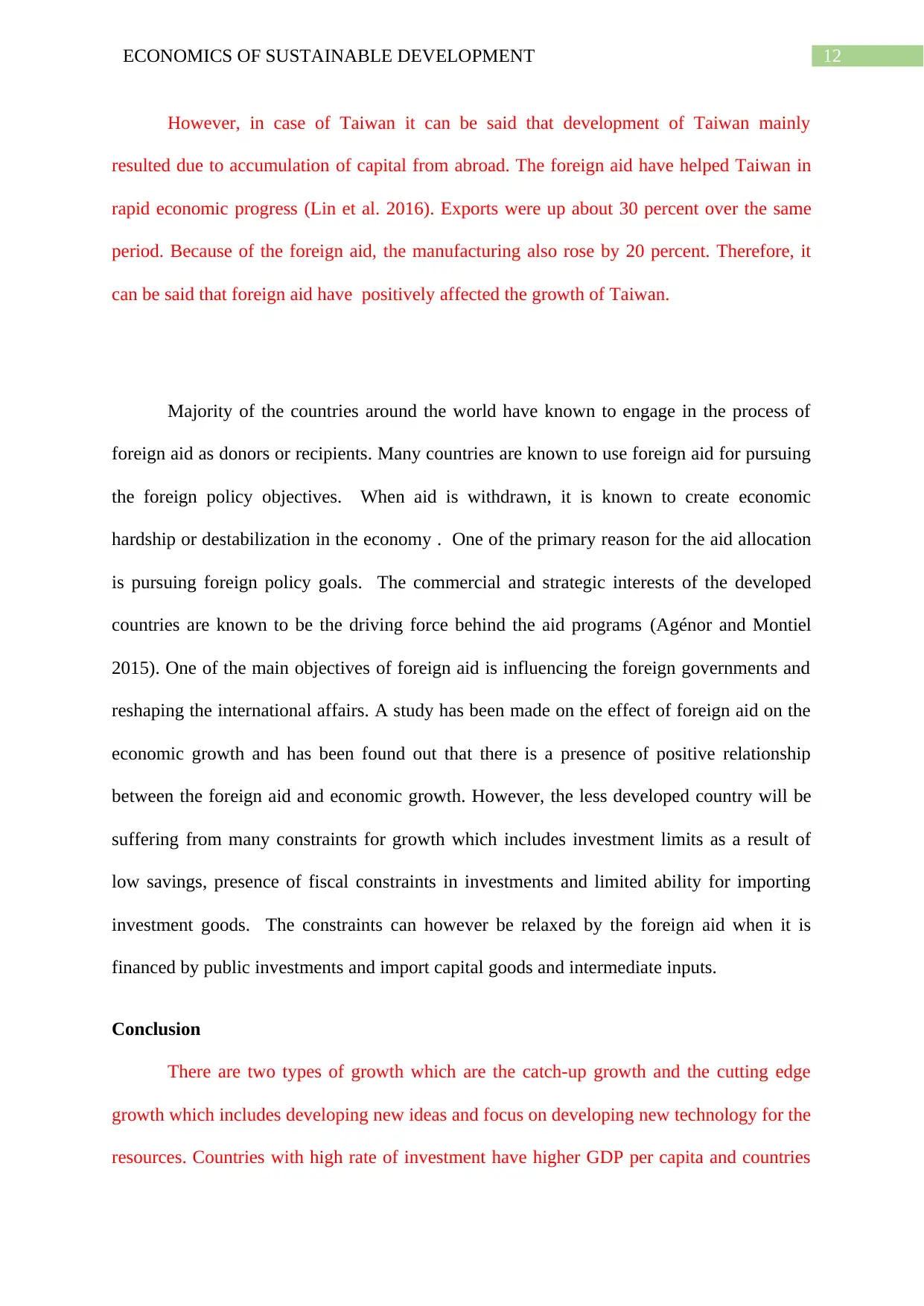
12ECONOMICS OF SUSTAINABLE DEVELOPMENT
However, in case of Taiwan it can be said that development of Taiwan mainly
resulted due to accumulation of capital from abroad. The foreign aid have helped Taiwan in
rapid economic progress (Lin et al. 2016). Exports were up about 30 percent over the same
period. Because of the foreign aid, the manufacturing also rose by 20 percent. Therefore, it
can be said that foreign aid have positively affected the growth of Taiwan.
Majority of the countries around the world have known to engage in the process of
foreign aid as donors or recipients. Many countries are known to use foreign aid for pursuing
the foreign policy objectives. When aid is withdrawn, it is known to create economic
hardship or destabilization in the economy . One of the primary reason for the aid allocation
is pursuing foreign policy goals. The commercial and strategic interests of the developed
countries are known to be the driving force behind the aid programs (Agénor and Montiel
2015). One of the main objectives of foreign aid is influencing the foreign governments and
reshaping the international affairs. A study has been made on the effect of foreign aid on the
economic growth and has been found out that there is a presence of positive relationship
between the foreign aid and economic growth. However, the less developed country will be
suffering from many constraints for growth which includes investment limits as a result of
low savings, presence of fiscal constraints in investments and limited ability for importing
investment goods. The constraints can however be relaxed by the foreign aid when it is
financed by public investments and import capital goods and intermediate inputs.
Conclusion
There are two types of growth which are the catch-up growth and the cutting edge
growth which includes developing new ideas and focus on developing new technology for the
resources. Countries with high rate of investment have higher GDP per capita and countries
However, in case of Taiwan it can be said that development of Taiwan mainly
resulted due to accumulation of capital from abroad. The foreign aid have helped Taiwan in
rapid economic progress (Lin et al. 2016). Exports were up about 30 percent over the same
period. Because of the foreign aid, the manufacturing also rose by 20 percent. Therefore, it
can be said that foreign aid have positively affected the growth of Taiwan.
Majority of the countries around the world have known to engage in the process of
foreign aid as donors or recipients. Many countries are known to use foreign aid for pursuing
the foreign policy objectives. When aid is withdrawn, it is known to create economic
hardship or destabilization in the economy . One of the primary reason for the aid allocation
is pursuing foreign policy goals. The commercial and strategic interests of the developed
countries are known to be the driving force behind the aid programs (Agénor and Montiel
2015). One of the main objectives of foreign aid is influencing the foreign governments and
reshaping the international affairs. A study has been made on the effect of foreign aid on the
economic growth and has been found out that there is a presence of positive relationship
between the foreign aid and economic growth. However, the less developed country will be
suffering from many constraints for growth which includes investment limits as a result of
low savings, presence of fiscal constraints in investments and limited ability for importing
investment goods. The constraints can however be relaxed by the foreign aid when it is
financed by public investments and import capital goods and intermediate inputs.
Conclusion
There are two types of growth which are the catch-up growth and the cutting edge
growth which includes developing new ideas and focus on developing new technology for the
resources. Countries with high rate of investment have higher GDP per capita and countries
⊘ This is a preview!⊘
Do you want full access?
Subscribe today to unlock all pages.

Trusted by 1+ million students worldwide
1 out of 15
Related Documents
Your All-in-One AI-Powered Toolkit for Academic Success.
+13062052269
info@desklib.com
Available 24*7 on WhatsApp / Email
![[object Object]](/_next/static/media/star-bottom.7253800d.svg)
Unlock your academic potential
Copyright © 2020–2026 A2Z Services. All Rights Reserved. Developed and managed by ZUCOL.





